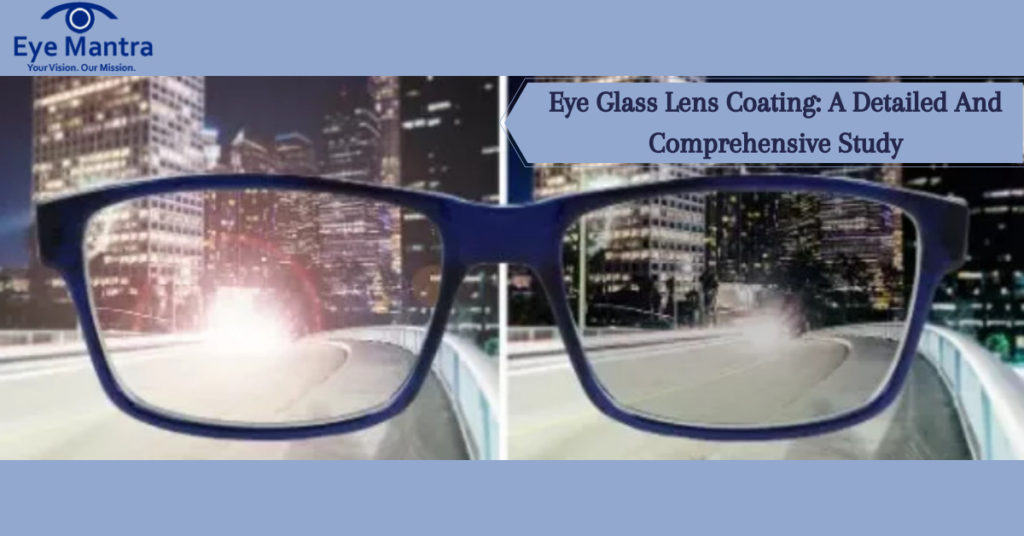The lens of an eyeglass has different coatings to enhance its durability, performance, and these coatings serve important purposes. Eyeglass coatings are available for all types of glasses, be it a single vision, bifocal, or progressive lenses. Before buying glasses you should have a look at the eyeglass coatings that are available and how they are beneficial.
Contents
Types of Eyeglass Lens Coatings
There are 4 types of eyeglass lens coatings:
- Anti-reflective coatings
- Anti-fog coatings
- UV protection
- Scratch Resistant coatings
Anti-reflective coatings
Anti-reflective coating eliminates any reflections from the surfaces of the eyeglass lens. If there are no reflections, then more light can pass through the lens thus optimizing the visual acuity with fewer distractions. No reflections make the eyeglass lenses look nearly invisible which therefore draws more attention towards the eyes. Anti-reflective lens coating is applied using a highly technical process that involves vacuum deposition technology. More the layers present in the lens lesser the reflection, thus some anti-reflective coatings have up to 7 layers in them.
Advantages of anti-reflective coatings lenses
1. Anti-reflective lens coatings can provide sharper vision and less glare with comfort while having a lot of screen time.
- Anti-reflective lens coatings can enhance the clarity and comfort of photochromic lenses during all light conditions without reducing their sun-reactive performance.
- Anti-reflective coating when used in sunglasses reduces the glare from sunlight reflecting in our eyes from the back surfaces of the sunglasses.
- Anti-reflective lens coatings also include surface treatments that make the lenses Hydrophobic (preventing the lens from water spots) thus easier to clean.
- An anti-reflective lens can also provide surface treatments that can make the lens Oleophobic, thus preventing it from oil spots.
How to take care of lenses with anti-reflective coatings:
Your optician will recommend products to clean lenses with Anti-reflective coatings. Common lens cleaners contain harsh chemicals which can damage anti-reflective coating in the lens.
The lens with an Anti-reflective coating should always be cleaned after the lens is wet otherwise it may cause scratches. These coatings prevent reflection thus scratches are more visible on it.
When to get anti-reflective coatings?
Anti-reflective coatings are recommended by an optician if you have a lot of screen time. These coatings filter out the blue light too. Your optician will tell you depending on your lifestyle if you are fit for this coating.
Anti-Fog Coatings
In Anti-fog coating the factory-applied coating called fog-free eliminates the condensation of moisture on the lens which is used to cause fogging.
Advantages of anti-fog coatings:
- Anti-fog coating helps you make a clear transition from cold to warm climate.
- During sports when you are hot and perspiring, the coating prevents fogging too.
- The anti-fog coating can be applied on plastic, polycarbonate, and photochromic lenses.
Scratch-Resistance Coatings
Scratches are very frequent for people who wear glasses. Getting a new pair of expensive glasses and then dropping it is the worse thing. The glass does not break but they get scratches. To prevent scratches there is a coating called Anti-scratch coating which is a hard protective layer in the front and back of the glass.
Advantages of scratch-resistance coating:
The scratch-resistant coating has the following advantages:
- Prevents scratches and scrapes on the surface of the glasses.
- Makes the lens more durable, and they become less likely to break upon falling.
- It provides a clear vision.
It gets a longer lifespan as there are fewer chances of breakage.
How to remove scratches from the lens?
Scratch-resistant coating cannot prevent scratches completely. To make sure you avoid scratches on your glass you should:
- Clean the glasses regularly with appropriate cleaning material.
- Use a cloth that comes with your eyeglasses and not shirt/ paper towels.
- Use mild detergents with warm water or optical solutions to clean your glasses.
- Make sure to put your glasses, in their case when you are not using them.
If you get small minor scratches, then they can be fixed with household materials like cloth and toothpaste. If rubbed in circles the scratches can be repaired. Baking soda can also be used in the same way after making a thick paste with water.
Are scratches-resistant lenses suitable for me?
If you have an active lifestyle for example:- If you play sports regularly then a Scratch-resistant coating is perfect for you. You coatings that can withstand physical contact. If you are absent-minded and leave glasses unprotected, then these glasses are made for you.
UV Protection Coatings
UV radiations coming from the sun which is very harmful to our skin. UV radiations can also affect our eyes. Excessive exposure to UV can cause inflammation in the cornea or a sunburn in the eye. They can cause red eyes, sensitivity to light, or eye pain. Long-term exposure may also lead to cataracts, retinal damage, macular degeneration, or pterygia. UV protection is the coating that blocks the ultraviolet rays, from completely reaching the eyes. Sunscreen protects our skin from UV damage, similarly, UV protection coating protects our eyes from UV rays and prevents them to reach our eyes.
UV sunglasses protects our eyes from UV-A and UV-B rays. Sunglasses that offer 100% protection from UV rays, also protect our eyes from blue light. Glasses come with different types of coatings and also with several advantages. Some of these are recommended by your eye doctor, depending on your lifestyle.
To consult an experienced eye doctor and to get more details about these coatings contact our center: Eye mantra-in Delhi. Ph: 9711115191.
Also Read,
Computer Glasses:- Relieving Computer Eye Strain
Meaning of Numbers: Inside the Eyeglasses Frames



